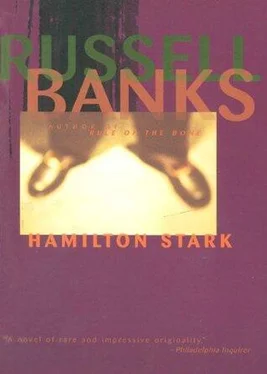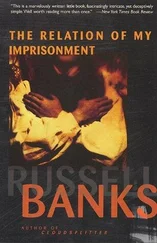“I’m sorry,” I said, my voice hushed with contrition. “You’re right, you’re quite right, of course.” I handed her drink to her, and holding on to my own as if it were a kitten, I sat down next to her on the bed. “Please. Please tell me how Hamilton, how your father almost went to college. It’s a chapter in his life I know nothing about. I’d even forgotten it existed, that you had mentioned its existence that day after your graduation ceremonies, until you mentioned it again tonight, I mean this morning.”
“Yes, this morning. It’s late,” she yawned, stretching her long white arms in the milky light, and once again I found myself having to deal with my own tumescence.
“Tired?” I asked.
“Yes,” she answered. “But still, I want you to hear this. It might help you to know important things about him. It’s a short story, I can tell it to you in a few minutes, and tomorrow, later today, I mean, I’ll let you have the chapter from my novel that describes the adventure. As a matter of fact,” she went on, “I’ve been thinking of turning the entire manuscript, even my notes and tapes, over to you, to let you use in any way that pleases you.” She yawned again, as if with disinterest in my response.
I was shocked. “What? What do you mean?” Her novel, the obsession-driven activity of her last four years? Give it up, just like that?
“Yes. I’ve made a decision. I think it’s a waste of my time to be writing a novel about the man — I mean that kind of self-consciousness, that kind of objectification. It all seems to run counter to what I’m to learn from the man. From what I am learning. It’s hard to describe. You write the novel. If you can. I can’t. And even if I could, I’d never bring myself to publish it,” she added with a wry smile.
I was twice shocked. She sat there, looking straight ahead into space, apparently close to emotionless, as if she had once witnessed a glory or a horror that I hadn’t, announcing as she was to me in a passionless voice that she was canceling out the work of four years of her young life, hard, diligent work, boring research, arduous travel, careful visioning and revisioning, until she had nearly perfected a style and had mastered the content. I, her most confirmed admirer, could not believe that she would cancel this enterprise, that she, simply and practically without feelings, would turn the manuscript over to me for my grimy use. (Relatively speaking, of course. I can’t pretend to be that self-deprecating.)
“Listen,” I said to her, “I love your novel!”
“Do you?”
“Yes!” I exclaimed. “It’s so … so … realistic!”
She said, “Well, you’ve still got a lot to learn, I’m afraid. But I can’t teach you. I’m still an initiate myself, you know. Here, here’s the story,” she began, and leaning back against the pillows, as the new day’s sunlight spilled into the room for the first time, she took a sip from her drink and told me the story of how Hamilton Stark almost went to college.
She was right. It wasn’t much more than a short story (she told it at one sitting), and, to fully understand the event, its subtler aspects, I did need the manuscript, which she delivered to me late that same afternoon. It was entitled “Fighting It, Giving Up,” Chapter Four, from The Plumber’s Apprentice . I’ve included it here, rather than try to summarize it or provide my own version, for the usual reasons: her handling of the material seems so much superior to what I could accomplish that only an insensitive egoist would proffer his own version instead. The name changes are the same as indicated earlier, when other portions of Rochelle’s novel were quoted. There is, however, one additional character here, the youth called Feeney, and though he appeared briefly in a chapter quoted in my Chapter Four, Addendum C, Rochelle’s Chapter Eight, “Return and Depart,” at that time I said that no one corresponded to Feeney in Hamilton’s, A’s, life. It now appears that I was wrong. Rochelle, through diligent, wily research, has uncovered the prototype for Feeney, a man named F., who now works as a machine operator in a tannery in Penacook. He and A. rarely see each other these days, and then only by accident.
Chapter 4
FIGHTING IT, GIVING UP
It positively amazed Alvin that he could get in his car and drive it over the hills for four hours roughly north and west, stop the car, get out, walk into a bar, order a drink, and be served legally. Well, not quite legally, even here in New York State, because he was only seventeen, but even so, it was still enough to astound him when he and Feeney strode through the door of the Valley Café in Ausable Chasm, New York, and each ordered a Seven-and-Seven, that the bartender merely served them and took their money.
It was a Friday in November, Alvin’s senior year in high school. He was a football star and a good student, “especially in math.” Everyone said so. He had driven to Ausable Chasm this day for an interview with the dean of admissions of the little-known engineering institute located at the edge of the small town. Feeney had gone along to keep him company and “for laughs,” he’d said, and while Alvin was being interviewed, he’d taken the car and had driven around the town looking for a bar that he thought, from its appearance, would serve them without asking for IDs. “I got a sixth sense for these things,” he had explained as he drove off in Alvin’s Ford.
It was a raw, rainy day, blustery and dark, and Alvin wore only a lightweight cloth raincoat over his charcoal gray flannel suit, and he carried no umbrella, so by the time he had located and entered the brick, armorylike administration building, his clothes, hair and shoes were soaked through. Miserably uncomfortable and smelling like a wet, long-haired animal, he sat through a painful fifteen-minute interview with a blond crew-cut young man who never once smiled as he asked Alvin questions about the size of Pittsfield High School, the percentage of the graduating seniors who went on to college, and the range of courses offered there. “We’ve never had an applicant from your school before,” the somber young man explained.
“Oh, I see,” Alvin said.
A few minutes later, when, in answer to the dean’s inquiry as to the possibility of Pittsfield’s football team winning the state championship, Alvin had laughed and said, “Never!” it was the dean who said, “Oh, I see.”
It had gone on like that, the two of them saying soberly, “Oh, I see,” perhaps half a dozen times each, ending with Alvin’s pointing out that he would need a scholarship, a full scholarship, to go to college, because his parents were unable to help him financially. “My father’s a plumber,” he added helpfully.
The dean had said, “Oh, I see,” one more time and then, “Yes,” and then, “Well, yes,” and had ushered him back to the outer office, where they shook hands and grimly parted.
By the time Alvin reached the coffee shop near the campus where he’d arranged to meet Feeney, he was again soaking wet and he was growling. He was still growling when he sat down across from Feeney in the plastic-seated booth, and Feeney laughed.
“Let’s get the hell outa here,” Alvin said. “I gotta get plowed!”
Feeney went on laughing. He always laughed when Alvin started growling. That Alvin Stock, what a crazy guy! He gets pissed at something, he starts growling like some kinda mad dog or something. Really growling, and loud. Anybody can hear it. Like he was gonna tear somebody up with his teeth. What a crazy guy!
The growl was new — or rather, it had only recently been noticed by others. Alvin himself was still not quite aware of it, not even when it was timidly pointed out to him. He wasn’t sure what people heard when they laughed and said, “Hey, man, calm down! You’re growling , for chrissake!” But he knew what he felt — a knot, at first tightening in his chest, high up, and then slowly loosening as it rose in his throat and finally, between clenched teeth, squirted from his mouth. For him, the sound was merely that of his breath exhaling under pressure from below, scraping against resistance from above, the physiological opposite of a sigh.
Читать дальше












